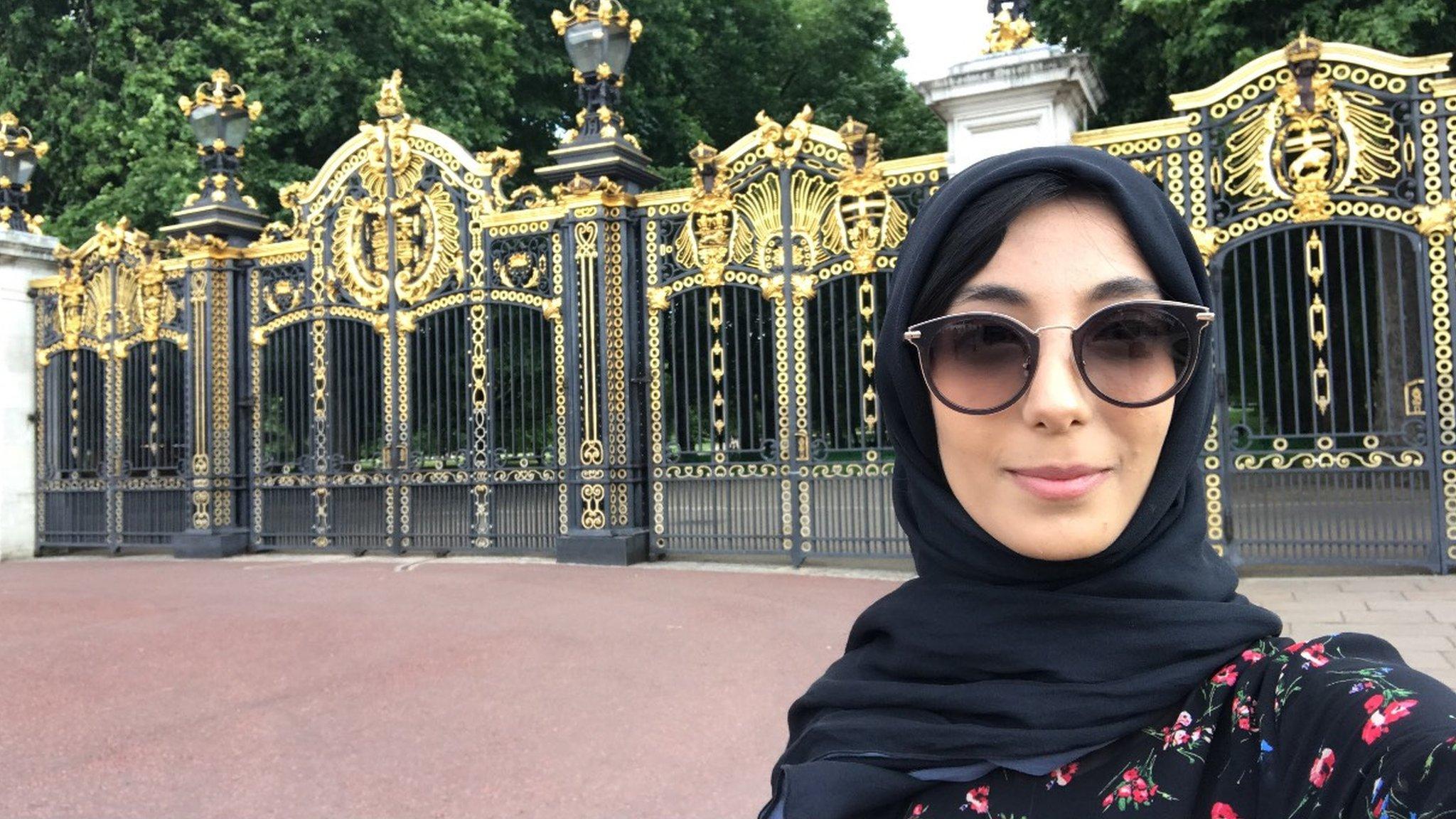Caruana Galizia case: Malta ex-corruption investigator fears for life
- Published
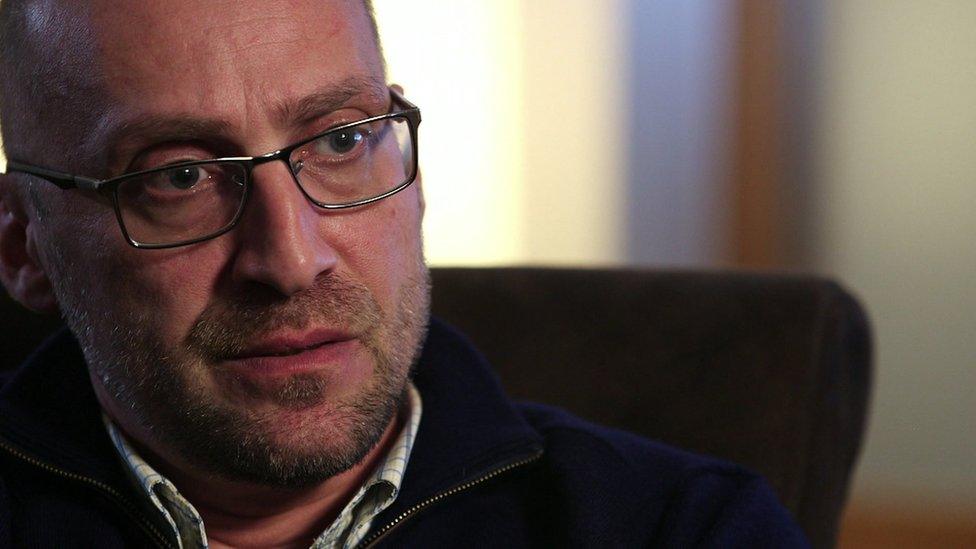
Jonathan Ferris has given important notes from his time in Malta's anti-money laundering agency to family and friends in case he is killed
A former anti-corruption investigator in Malta has told BBC Newsnight he fears for his life after looking into allegations made by murdered journalist Daphne Caruana Galizia.
Jonathan Ferris is seeking full police protection amid concerns he could be targeted after looking into her claims against top political figures.
Caruana Galizia was killed in a car bomb near her home on 16 October.
She was known for a blog in which she accused powerful figures of corruption.
Prosecutors are looking into the possibility that her murder was carried out by hitmen on the orders of someone angered by her reporting.
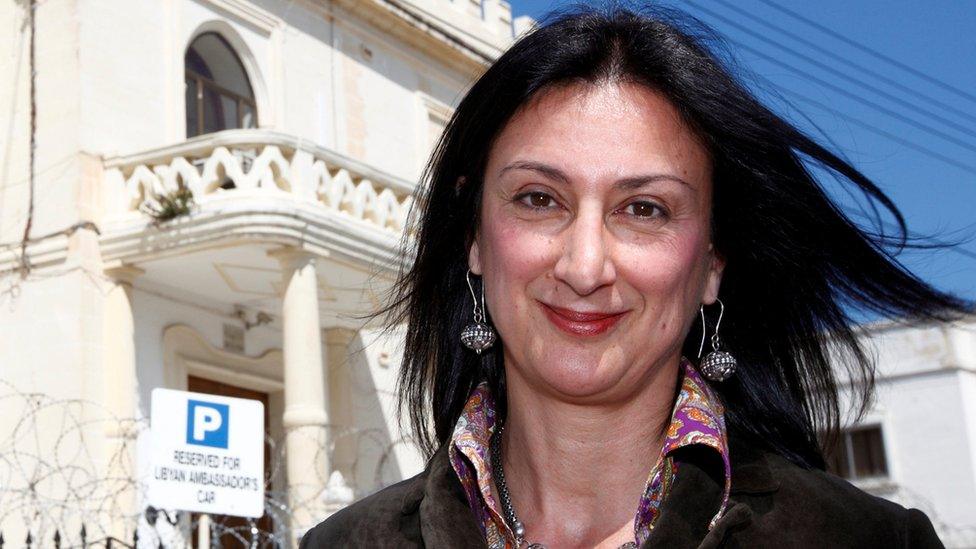
Daphne Caruana Galizia published scathing reports alleging official corruption
The Maltese government has vowed to bring her killers to justice and offered a €1m (£890,000; $1.2m) reward for information.
Why is Ferris frightened?
One of the investigations Caruana Galizia was working on at the time of her death centred on allegations against the Maltese prime minister's chief of staff, Keith Schembri, and a senior minister called Konrad Mizzi.
Caruana Galizia said they were both financial beneficiaries of secretive "shell" companies registered in Panama.
Mr Mizzi and Mr Schembri were named in the Panama Papers, a massive data leak from Panama law firm Mossack Fonseca in 2015. Both deny any wrongdoing and say their companies were never used.
Mr Ferris says he was looking into the case last year while working at the Financial Intelligence Analysis Unit (FIAU), Malta's anti-money laundering agency.
But he was sacked in June from the FIAU because, he believes, his work threatened to uncover sensitive secrets.
"We believe there was political interference," he told the BBC's Newsnight programme.
The FIAU has denied this. The anti-money laundering agency told the BBC that Mr Ferris's dismissal was based "solely on an objective and comprehensive performance assessment".
But Mr Ferris has now threatened to reveal information he discovered - "should something happen to me".
"Following 16 October, and what happened to Daphne Caruana Galizia, I divided my work and my information into six different envelopes with specific notes," he said.
"They are distributed to six members of family and close friends, and should something happen to me abruptly - say I'm killed - all that information will go public at once."
Jason Azzopardi, a shadow justice ministry spokesman, said Mr Ferris's fears that he could be targeted were "realistic".

Scared enough to carry a gun
By John Sweeney, BBC Newsnight
Malta is a house divided against itself. Supporters of Prime Minister Joseph Muscat applaud his economic boom while his detractors point to an enfeeblement of the rule of law - and the hard evidence for that is the assassination of his government's greatest critic, Daphne Caruana Galizia.
Unease and anxiety are part of Maltese life. Former money laundering investigator Jonathan Ferris fears for his life enough to carry a gun, legally.
Immediately after our interview, he offered me a ride back to my hotel. We walked through the gloom of an underground car park to his car and suddenly I felt a stab of terror - that getting blown up was not impossible.
Ferris turned the ignition and the engine started normally and I found myself laughing, too loud and too long. For a second or two, I had tasted the fear that grips those people in Malta who believe they know too much for their own good.
Watch: Malta's shame? The murder of journalist Daphne Caruana Galizia - BBC Newsnight, external

What else was Caruana Galizia investigating?
She alleged that a company owned by the Azerbaijani president's daughter paid $1m to a Panama company ultimately owned by the Maltese prime minister's wife, Michelle Muscat.
Speaking to the BBC Newsnight's John Sweeney, Mr Muscat categorically denied that he or his wife had used secret offshore accounts to hide payments from Azerbaijan's ruling family - and hit back at Caruana Galizia's reports.
"I know I am in a quite uncomfortable situation having to criticise someone who has been killed brutally."
But he added: "She didn't have any evidence because what she said was totally incorrect."
Mr Muscat also said Caruana Galizia's source was discredited. Caruana Galizia did not produce any documentary evidence to back up her allegation against the prime minister's wife.
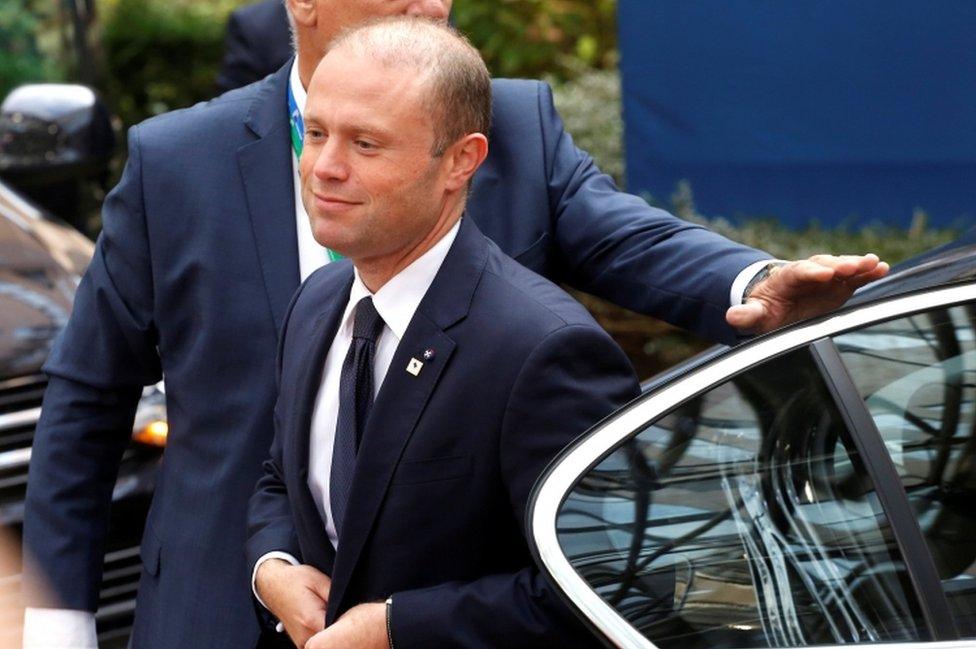
Maltese Prime Minister Joseph Muscat
In her popular blog, the journalist also alleged that Malta's Economics Minister Chris Cardona went to a brothel while at a conference in Germany in January 2017.
Mr Cardona denies any wrongdoing. He sued Caruana Galizia, saying he was in his hotel room at the time. That case is ongoing.
Who killed her?
Three brothers - George and Alfred Degiorgio, aged 55 and 53, and Vincent Muscat, 55 - have been charged with murder and pleaded not guilty.
Investigators say the killers detonated the bomb using a mobile phone on a boat offshore. They are looking into whom the suspects had contact with in the run-up to the killing.
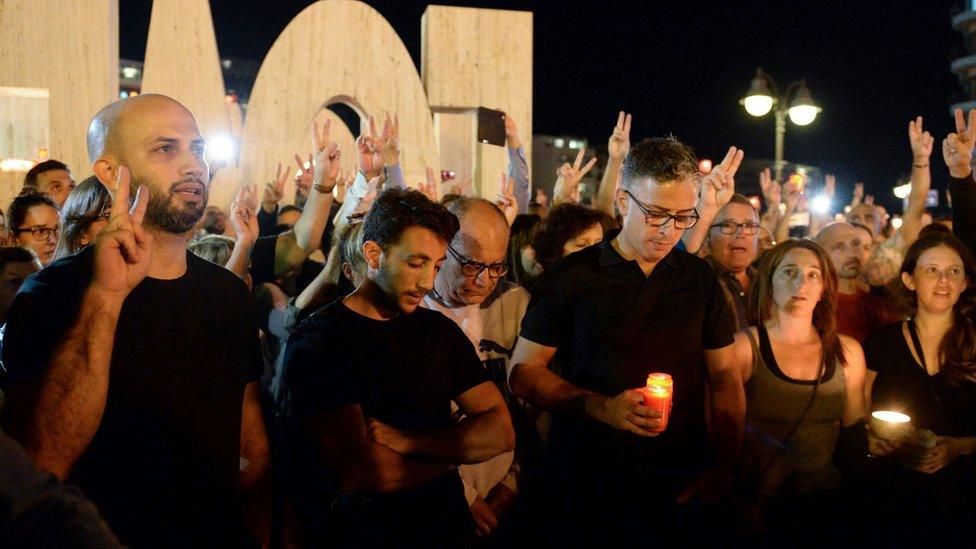
Thousands mourned the journalist in a silent, candle-lit vigil near Valletta in October
Friends of the journalist say they do not believe she investigated the three men charged with her killing.
"Daphne has never ever mentioned these three persons in none of her 20,000 articles," said Mr Azzopardi.
"It's an open secret that these are not the persons who commissioned the murder, and we will not rest until we find out who commissioned the murder and what was the motive."
- Published17 October 2017
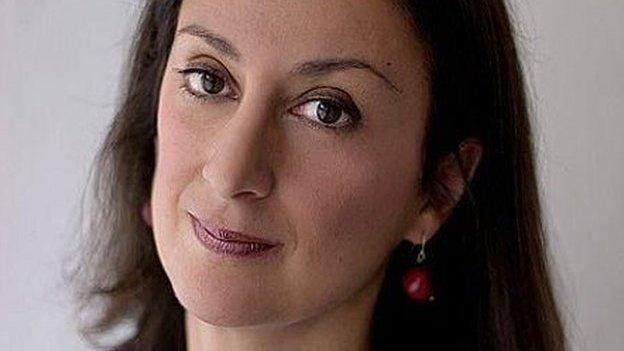
- Published3 November 2017
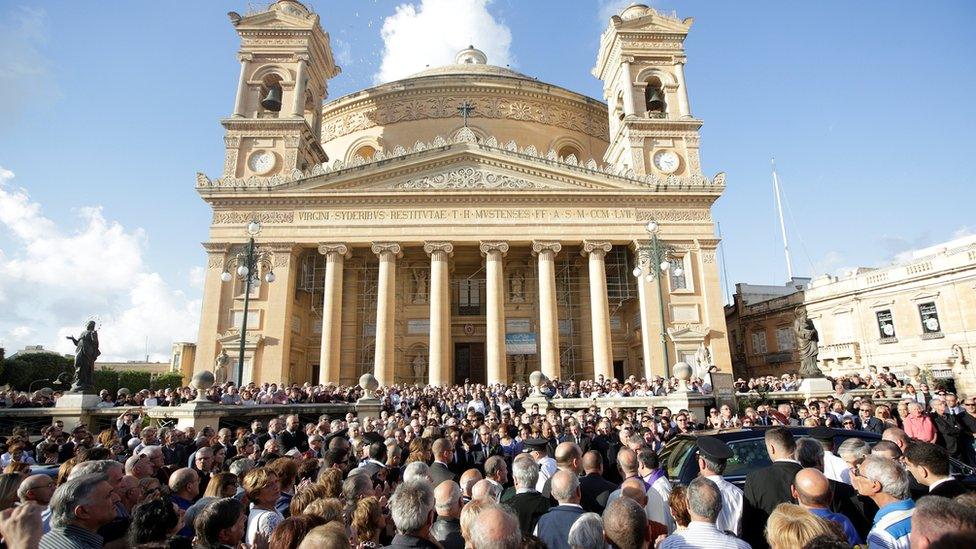
- Published19 October 2017
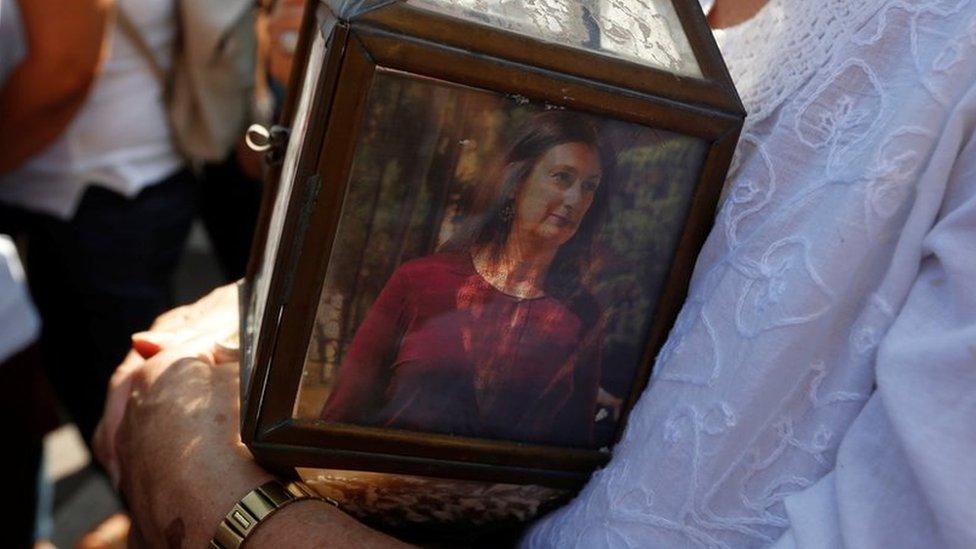
- Published23 August 2017
